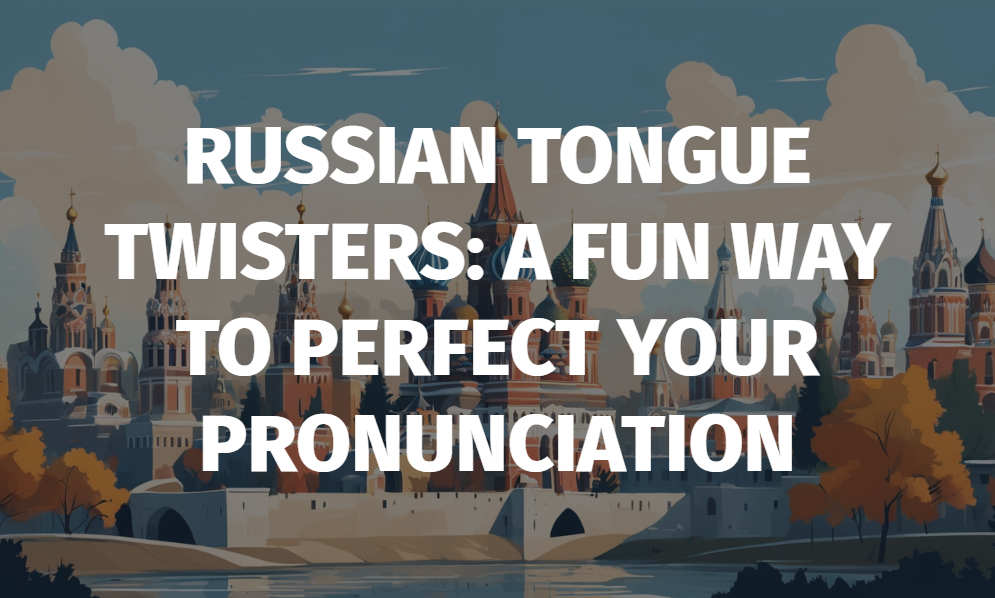
Russian Tongue Twisters: A Fun Way to Perfect Your Pronunciation
Tongue twisters, known as “скороговорки” (skorogovorki) in Russian, are an entertaining and effective way to improve your Russian pronunciation. These challenging phrases are designed to be difficult to articulate, especially when spoken quickly. For Russian language learners, they offer a playful method to practice tricky sounds and develop clearer speech. Let’s dive into the world of Russian tongue twisters!
Why Practice Russian Tongue Twisters?
1. Improve pronunciation: They help you master difficult Russian sounds.
2. Enhance fluency: Regular practice can increase your speaking speed and smoothness.
3. Boost confidence: Mastering these challenges can make regular Russian feel easier.
4. Learn new vocabulary: Many tongue twisters introduce new words in a memorable way.
5. Understand word stress: They help you internalize correct stress patterns.
How to Practice
1. Start slowly, focusing on correct pronunciation.
2. Gradually increase your speed as you become more comfortable.
3. Pay attention to stress and intonation.
4. Practice regularly, even if just for a few minutes a day.
5. Record yourself and compare with native pronunciations.
Popular Russian Tongue Twisters
Let’s explore some classic Russian tongue twisters, along with their translations and the sounds they target:
1. Карл у Кла́ры укра́л кора́ллы.
(Karl u Klary ukral karally)
– Translation: Karl stole coral from Clara
– Focuses on: The ‘r’ and ‘l’ sounds
– Tip: Pay attention to the soft ‘l’ in “Карл” and the rolled ‘r’ throughout
2. На дворе́ трава́, на траве́ дрова́. Не руби́ дрова́ на траве́ двора́.
(Na dvare trava, na trave drava. Nye rubee drava na travye dvara)
– Translation: There’s grass in the yard, there’s firewood on the grass
– Focuses on: The ‘v’, ‘r’, and vowel sounds
– Tip: Practice the distinction between ‘дворе’ (dvore) and ‘дрова’ (drova)
3. Шла Са́ша по шоссе́ и соса́ла су́шку.
(Shla Sasha pa shasse i sasala sushku)
– Translation: Sasha was walking along the highway and sucking on a dry breadstick
– Focuses on: The ‘sh’ and ‘s’ sounds
– Tip: Pay attention to the difference between ‘ш’ (sh) and ‘с’ (s)
4. Четы́ре чёрненьких чумазеньких чертёнка черти́ли чёрными черни́лами чертёж.
(Cheetyre chyornenkeekh chumazeenkeekh cheertyonka cheerteelee chyornymee cheerneelamee cheertyosh)
– Translation: Four little black dirty little devils were drawing a drawing with black ink.
– Focuses on: The ‘ch’ sound and soft consonants
– Tip: Practice the soft ‘ч’ (ch) sound and the vowel reduction in unstressed syllables
5. Бык тупогу́б, тупогу́бенький бычо́к, у быка́ бела́ губа́ была́ тупа́.
(Byk tupagub, tupagubeenkeey bychok, u byla beela guba byla tupa)
– Translation: The bull is thick-lipped, the little bull is thick-lipped, the bull’s white lip was thick.
– Focuses on: The ‘b’ and ‘p’ sounds
– Tip: Focus on the distinction between the voiced ‘б’ (b) and unvoiced ‘п’ (p)
Advanced Tongue Twisters
Once you’ve mastered the basics, try these more challenging ones:
1. Лигу́рия (Liguriya)
– This is just one word, but it’s notoriously difficult for non-native speakers to pronounce correctly.
– Focus on the soft ‘л’ (l) at the beginning and the correct stress on the ‘и’ (i).
2. В не́драх ту́ндры вы́дры в ге́трах ты́рят в вёдра ядра́ ке́дров
(V nedrakh tundry vydry v getrakh tyryat v vyodra yadra kedraf)
– Translation: In the depths of the tundra, otters in gaiters steal cedar nuts into buckets
– This one combines many challenging sounds and is excellent for advanced practice.
Incorporating Tongue Twisters into Your Learning
1. Daily warm-up: Start your Russian practice sessions with a tongue twister or two.
2. Focus on problem sounds: Choose tongue twisters that target sounds you find difficult.
3. Memorization challenge: Try to memorize a new tongue twister each week.
4. Speed trials: Time yourself saying a tongue twister three times perfectly.
5. Group practice: If possible, practice with other learners or native speakers for fun competition.
Conclusion
Russian tongue twisters are more than just a novelty; they’re a valuable tool for improving your pronunciation, fluency, and confidence in speaking Russian. While they can be challenging, the sense of accomplishment when you master a difficult скороговорка is immensely satisfying. Remember, the key is regular practice and a willingness to make mistakes. So, start slow, be patient with yourself, and most importantly, have fun! Удачи в освоении русских скороговорок! (Good luck mastering Russian tongue twisters!)